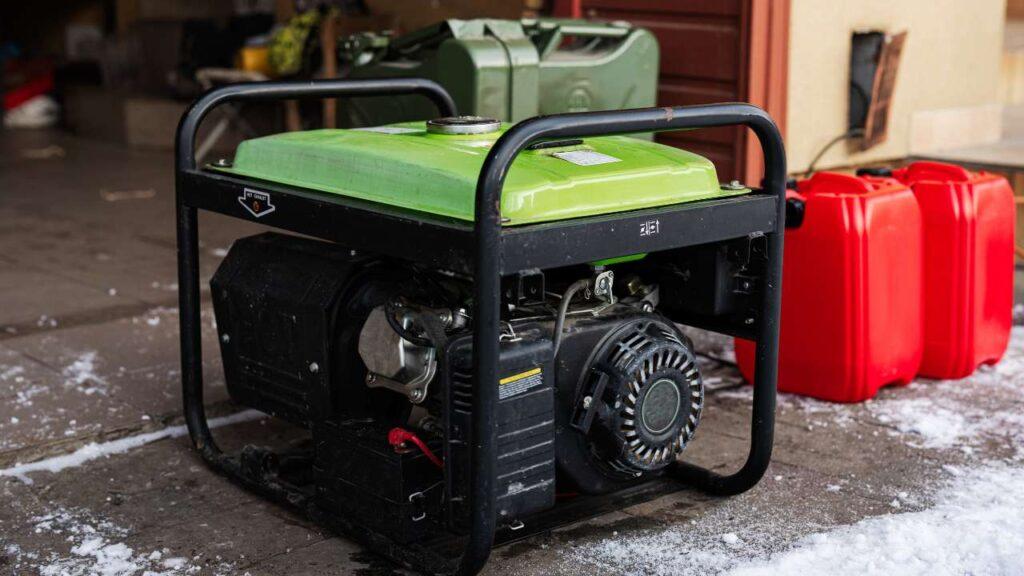
Choosing between power stations vs generators can be tricky. Both have their benefits and drawbacks, and the right choice depends on your specific needs. In this article, we’ll dive into the differences, advantages, and disadvantages of power stations and generators to help you decide which is best for your situation. Whether you’re planning for a camping trip or a generator for home backup power source, or want to know more about these devices, we’ve got you covered.
What are Power Stations?
Understanding what power stations are and how they work is crucial for deciding if they meet your power needs. Power stations are known for their portability and eco-friendly nature, making them a popular choice for many. In this section, we will explore the details of power stations, including how they operate, their benefits, drawbacks, and suitable use cases.
Power stations, also known as portable power banks or solar generators, are handy devices that store electrical energy. They’re designed to be easy to carry and use, making them perfect for various situations where portable power is needed. These devices are particularly useful for outdoor activities, emergency situations, and areas without easy access to power outlets.
How They Work
Power stations have built-in batteries that store energy. You can charge these batteries using different sources, such as solar panels, wall outlets, or car chargers. Once charged, the power station can supply electricity to various devices through outlets like AC, USB, and DC. The internal battery capacity determines how much power the station can store and deliver, affecting how long and how many devices it can power.
Benefits of Power Stations
- Portability: Power stations are small and lightweight, making them easy to transport. You can carry them in your car, backpack, or even by hand without much effort.
- Eco-Friendly: Many power stations can be charged using solar panels, which is great for the environment. This makes them an excellent choice for those looking to reduce their carbon footprint.
- Quiet Operation: They operate silently, so you can use them indoors without noise disturbance. This feature is especially beneficial in quiet settings like campsites or homes during power outages.
Drawbacks of Power Stations
- Limited Power Capacity: They might not be able to power large appliances for a long time. This makes them unsuitable for high-energy devices like refrigerators or air conditioners for extended periods.
- Recharge Time: Charging, especially with solar panels, can be slow depending on the sunlight available. This can be a disadvantage in situations where quick recharging is necessary.
Suitable Use Cases for Power Stations
- Camping Trips: Perfect for keeping your phone, camera, and other small devices charged. They are convenient for outdoor enthusiasts who need reliable power for their gadgets.
- Emergency Power: Useful during short power outages to keep essential devices running. They can power lights, phones, and small medical devices, ensuring you stay connected and safe.
- Outdoor Events: Great for powering small appliances and lighting. Whether you’re hosting a backyard party or an outdoor wedding, power stations provide a silent and clean power source.
Power stations offer a blend of portability, eco-friendliness, and quiet operation, making them ideal for various scenarios. However, their limited power capacity and slow recharge time can be limiting factors. Understanding these aspects will help you determine if a power station is the right choice for your needs.
What are Generators?
Generators are a more traditional solution for power needs, known for their high output and versatility. They are commonly used in homes, construction sites, and large outdoor events. In this section, we will explore the details of generators, including their operation, benefits, drawbacks, and suitable use cases.
Generators are machines that convert mechanical energy into electrical energy. They typically run on fuels like gasoline, diesel, propane, or natural gas. Generators come in various sizes and power capacities, from small portable units to large stationary models capable of powering an entire home.
How They Work
Generators have an engine that runs on fuel to produce mechanical energy. This energy is then converted into electricity through an alternator. You can use the generated electricity to power various appliances through different outlets. The right fuel type and engine size determine the generator’s power output and runtime.
Benefits of Generators
- High Power Output: Generators can run large appliances and multiple devices at once. This makes them suitable for high-demand situations like home backup or construction sites.
- Fuel Availability: They can be quickly refueled, ensuring a continuous power supply. Fuel sources like gasoline and propane are widely available, making it easy to keep the generator running.
- Versatility: Suitable for both indoor and outdoor use with proper ventilation. They can power a wide range of devices and appliances, from household electronics to heavy-duty machinery.
Drawbacks of Generators
- Noise: Generators can be quite loud, especially those powered by gas. This can be a significant drawback in noise-sensitive environments like residential areas.
- Emissions: They produce fumes that can be harmful if not ventilated properly. This makes them less ideal for indoor use without adequate ventilation.
- Maintenance: Requires regular upkeep to ensure they work properly. This includes tasks like changing the oil, replacing air filters, and checking fuel lines.
Suitable Use Cases for Generators
- Home Backup: Great for powering essential household appliances during long power outages. They can keep your refrigerator, lights, and other critical devices running until the power is restored.
- Construction Sites: Provides reliable power for tools and equipment. Generators are essential for powering drills, saws, and other heavy-duty tools on job sites without access to grid power.
- Outdoor Events: Can power large setups like lighting, sound systems, and catering equipment. They are ideal for events that require significant power beyond what small portable power stations can provide.
Generators offer a powerful and versatile solution for various power needs. While they provide high power output and continuous operation, their noise, emissions, and maintenance requirements are important considerations. By understanding these factors, you can determine if a generator is the best choice for your power needs.
Comparison Between Power Stations And Generators
Now that we have covered what power stations and generators are, let’s compare them directly. This section will help you understand the key differences and similarities, making it easier to choose the right option for your specific needs.
Power Output
- Power Stations: Best for low to moderate power needs, suitable for small devices and light appliances. They are ideal for charging phones, laptops, and small lights.
- Generators: Suitable for high-power needs, can run heavy-duty appliances and multiple devices at once. They can power refrigerators, air conditioners, and large power tools.
Portability
- Power Stations: Highly portable, easy to transport and store. Their compact size and light weight make them perfect for travel and outdoor activities.
- Generators: Less portable due to size and weight, though some compact models are available. Larger generators often have wheels and handles to aid in transportation.
Environmental Impact
- Power Stations: Eco-friendly, especially when solar-charged, with no emissions. They are a great choice for reducing your carbon footprint.
- Generators: Emit fumes and can contribute to pollution, especially gas and diesel models. Propane and natural gas generators are cleaner but still produce emissions.
Noise Levels
- Power Stations: Operate silently, making them ideal for quiet environments. You can use them indoors without disturbing others.
- Generators: Can be noisy, requiring consideration of noise levels for indoor and residential use. Some models are designed to be quieter, but they are still louder than power stations.
Cost
- Power Stations: Initial cost can be high, but low maintenance and operating costs. Solar charging eliminates fuel costs, and minimal maintenance is required.
- Generators: Wide price range, but fuel and maintenance costs add up over time. Generators require regular servicing, and fuel costs can be significant, especially for long-term use.
Comparing power stations and generators highlights their unique advantages and limitations. Power stations are ideal for portability, eco-friendliness, and quiet operation, while generators offer higher power output and versatility. Understanding these differences will help you choose the best power solution for your specific needs.
Choosing The Right Option for Your Needs
Choosing between power stations and generators requires assessing your power needs, budget, environmental concerns, and practical considerations. This section will guide you through these factors, helping you make an informed decision.
Assessing Your Power Needs
To choose the right option, you need to assess your power needs. Power stations are suitable for small-scale, short-term power needs. They are ideal if you need a portable and eco-friendly option. Generators are best for large-scale, long-term power needs. They are suitable for high-power demands and versatile usage.
Budget Considerations
Consider your budget when choosing between a power station and a generator. Power stations might have a higher upfront cost, but you will save on long-term fuel and maintenance. Generators, on the other hand, incur ongoing costs for fuel and maintenance, though the initial purchase price varies widely.
Environmental and Noise Concerns
If reducing your carbon footprint is a priority, opt for power stations, especially those that can be charged using solar panels. For noise-sensitive environments, power stations are the better choice due to their silent operation. Generators can be noisy and produce emissions, which might not be ideal for all situations.
Practicality and Convenience
Power stations offer plug-and-play simplicity with minimal setup, making them very user-friendly. Generators require fuel management and regular maintenance to ensure they work properly. Consider which option is more practical and convenient for your specific needs.
Choosing the right power solution involves weighing your specific needs against the strengths and weaknesses of each option. Power stations excel in portability, eco-friendliness, and quiet operation, while generators provide robust power and versatility. By carefully considering your power needs, budget, and environmental concerns, you can make a well-informed decision that ensures you have the reliable power source you need.
Wrapping It Up!
Both power stations and generators have their unique advantages and disadvantages. Power stations are excellent for eco-friendly, portable power on the go. They are perfect for camping trips, outdoor events, and short-term emergency power needs. Generators, on the other hand, offer robust power solutions for high-demand situations. They are ideal for home backup, construction sites, and large outdoor events.
When choosing between a power station and a generator, consider your specific power needs, budget, environmental impact, and noise levels. By understanding the differences and evaluating your priorities, you can select the most suitable power source to meet your needs effectively. Whether you opt for a power station or a generator, having a reliable power source will ensure you are prepared for any situation.
Related FAQs
Can power stations be used indoors?
Yes, power stations can be used indoors as they produce no emissions and operate silently.
How long do power stations last?
The lifespan of a power station depends on its battery capacity and usage, typically ranging from a few years to a decade.
Are generators safe to use during storms?
Generators can be used during storms but should be kept dry and operated in well-ventilated areas to avoid carbon monoxide poisoning.
Do power stations require maintenance?
Power stations require minimal maintenance, mainly ensuring the battery is charged and stored properly.
Which is more cost-effective in the long run, a power station or a generator?
Power stations can be more cost-effective long-term due to lower maintenance and fuel costs compared to generators.
At our core, we’re a group of passionate generator, inverter, solar energy, battery enthusiasts. We dive deep into the world of tech, especially when it’s about powering your home, RV or outdoors. We try to provide as much value to the readers with our information and how to blog articles as possible. For affiliate articles our honest and transparent reviews of essential tech products are rooted in real-world experience. We take great satisfaction in offering unbiased evaluations, ensuring that you can make informed decisions when investing in your desired techs.




